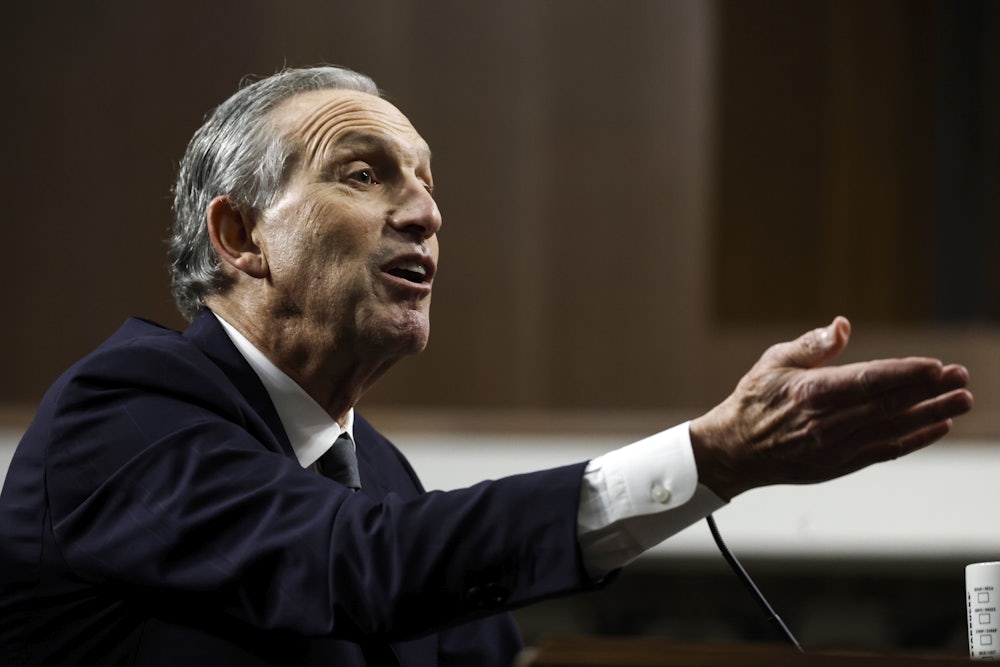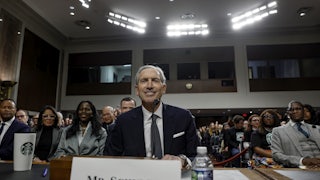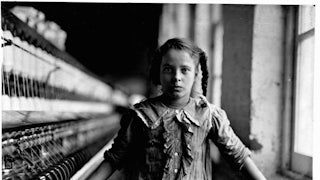Union-busting, to borrow from H. Rap Brown, is as American as cherry pie. Employers get charged with violating federal labor law in no fewer than 41.5 percent of all union elections, according to the nonprofit Economic Policy Institute. That’s why calling Howard Schultz to account for illegal union-busting at Starbucks prompted cries of unfairness Wednesday by Republican members of the Senate Health, Education, Labor, and Pensions, or HELP, Committee. It really is unusual for Congress to make a fuss when a respectable corporation, or (more typically) whatever contractor it hires to run its de facto workforce, muscles aside labor unions.
But Starbucks is an unusual violator. It’s “the most aggressive union-busting company in America,” according to a HELP Committee report issued March 26, with more than 500 unfair labor practice charges filed against it. As of August 2022, Starbucks had more National Labor Relations Board cases going than any other private company in the United States. Harvard Law School’s Sharon Block, who ran the Office of Information and Regulatory Affairs for a while in the Biden White House, said at Wednesday’s hearing: “I’m not aware of another company in recent years that has this level of allegations made against it.”
At the hearing, Schultz, who ended a one-year gig as Starbucks chairman on March 20—having previously been chairman in 1986–2000 and 2008–2017—adopted a tone of wounded innocence. He noted that Starbucks calls its workers “partners” and that it offers comprehensive health insurance to all employees, tuition benefits, parental leave, and a 401(k) with company match. “Is there a union that you’re aware of,” Schultz asked Senator Ed Markey, “that has those benefits, sir?” What Markey should have answered, but didn’t, was that the health coverage was actually negotiated in 1986 by the United Food and Commercial Workers. Schultz bought the company the following year, and by 1992 the union was gone.
People were looking forward to this hearing because it would pit America’s biggest union buster against celebrity socialist Bernie Sanders, the committee’s chairman. But Sanders’s interrogation of Schultz wasn’t all that interesting. Sanders ran through a series of assertions about Starbucks, and Schultz mostly denied them. It was the other Democratic members who best probed Schultz’s squirrelly attitude that a union drive represented a personal rebuke.
Schultz began by telling the committee that he grew up in public housing (in Canarsie, Brooklyn) and that when his father, “a World War II veteran, slipped on a sheet of ice in 1960,” he “was promptly fired from his job as a delivery driver. It fractured our family, and it deeply scarred me. I decided at an early age that if I was ever in a position to run a business, it would be based on respect and shared success.”
Schultz has related before how these childhood experiences shaped him. When he bought Starbucks in 1987, he wrote in a 1997 memoir, he wanted his employees
to believe in their heart of hearts that management trusted them and treated them with respect. I was convinced that under my leadership employees would come to realize that I would listen to their concerns. If they had faith in me and my motives, they wouldn’t need a union.
The corollary is that if the workers want a union, that means they don’t love you. Senator Tina Smith, a Minnesota Democrat, called Schultz out on this. “I have been really struck by your focus on what an excellent company you are,” she said.
Honestly it seems as if you are personally offended, or insulted, that anyone would ever question you or your company. It seems as though you feel that only a bad company should be unionized.… Starbucks doesn’t need a union because you are a good company. I think, Mr. Schultz, that is not your decision to make.
Schultz didn’t dispute that he believes unions are only for bad companies. It’s a common delusion among managers, especially the more narcissistic types. (Schultz, a longtime Democratic donor, flirted seriously with running for president as an independent in 2020.) I thought of Robert Caro’s poignant final line in The Power Broker, his biography of Robert Moses: “Why weren’t they grateful?”
They might be more grateful if Starbucks didn’t engage so vigorously in union busting. Schultz denied repeatedly at the hearing that Starbucks, in resisting union organizers, broke any laws. That’s impossible to reconcile with the fact that since Starbucks workers started organizing in earnest in 2021, NLRB administrative law judges have ruled against Starbucks in no fewer than 130 separate decisions. (Starbucks is appealing all of these.) “It is akin,” said Democratic Senator Christopher Murphy of Connecticut, “to someone who has been ticketed for speeding 100 times saying I have never violated the law because every single time, every single time, the cop got it wrong. That would not be a believable contention.” Shultz’s robotic reply: “I don’t believe Starbucks has broken the law.”
Since the first union victory at a U.S. Starbucks store, in December 2021 in Buffalo, 291 locations have unionized. Not one of those elections has resulted in a union contract. Schultz was asked about this. His reply was that Starbucks tried to set up 365 meetings but was able to attend only 85 because workers kept insisting on conducting them on Zoom or allowing certain union negotiators to participate via Zoom, and he wasn’t willing to do that for fear the negotiations wouldn’t be kept private. “We should not be held accountable for not showing up when all we ask is for face-to-face meetings,” Schultz said. But NLRB General Counsel Jennifer Abruzzo’s office is arguing in administrative law proceedings that refusing to participate on these grounds violates labor law.
The hearings put congressional Republicans in an odd position.
On the one hand, they kept insisting that it was terribly unfair for Sanders to single out Starbucks. “It’s a smear campaign against an individual and a company based upon allegations that everyone knows are still under litigation,” ranking member Bill Cassidy of Louisiana said. “Let’s not kid ourselves. This is not a fair and impartial hearing.” Rand Paul invoked Ayn Rand on society’s determination to destroy its visionary Howard Roarks.
But on the other hand, congressional Republicans wanted to distance themselves from Starbucks at the hearing because Starbucks represents precisely the latte-sipping cultural elite against which the GOP wages culture war. “I recognize at the outset,” said Republican Mitt Romney of Utah, “there’s some irony to a non-coffee-drinking Mormon conservative defending a Democrat candidate for president in perhaps one of the most liberal companies in America.” Paul, after genuflecting before his libertarian namesake, got some digs in too. “Who knew people would pay six bucks for a cup of coffee?” he marveled. Maxwell House, he said, is good enough for the Paul clan.
The Republicans resolved this conflict by changing the subject at every opportunity to discuss Starbucks’s allegation that the NLRB engaged in some sort of misconduct in three union elections and that an NLRB whistleblower can verify it. Even if true, the allegation, which is being reviewed by the NLRB’s inspector general, couldn’t explain why Starbucks is the target of more unfair labor practice complaints than any other company in America—30 percent more than the second-most-common target, United Parcel Service—or why NLRB administrative law judges have ruled against Starbucks in 130 decisions. It would be very difficult, it seems to me, to rig 291 successful union elections.
Another diversion was a fight that Oklahoma Republican Markwayne Mullin picked with Sanders over Sanders’s book royalties, which he said earned him $8 million. Mullin said that Sanders had once said “that all CEOs are corrupt because they’re milllionaires. If you make a lot of money, you’re corrupt.” Yet “Mr. Chairman, you yourself have been very successful,” Mullin said. “Rightfully so! Glad you have been.” But “if you can be a millionaire, why can’t Mr. Schultz and others be millionaires and be honest too?”
Sanders replied irritably that “if I’m worth $8 million, that’s good news to me. I’m not aware of it; that’s a lie.” Also, Sanders said, “You’ve got no evidence that I ever said all CEOs are corrupt. I have never, ever said that.” Then Sanders mumbled a plug for his book.
Nobody squealed louder about being called rich than Schultz. What is it about billionaires that makes them so sensitive about being called, well, billionaires? Smith referred to Schultz as a billionaire in passing, and Schultz howled in pain. “The moniker of ‘billionaire,’ let’s just get at that, OK?” Schultz said.
I grew up in federally subsidized housing. My parents never owned a home. I came from nothing. I thought my entire life was based on the achievement of the American dream. Yes, I have billions of dollars. I earned it. No one gave it to me. And I have shared it … with people at Starbucks. And anyone who keeps labeling this “billionaire” thing—
Sanders tried to cut Schultz off because it was time to go to the next questioner, but Schultz wasn’t done: “It’s your moniker constantly, it’s unfair.”
Poor fellow. Like Charles Foster Kane, Howard Schultz just wants to be loved, but labor agitators are hell-bent on separating him, like Mr. Thatcher, from Rosebud.






